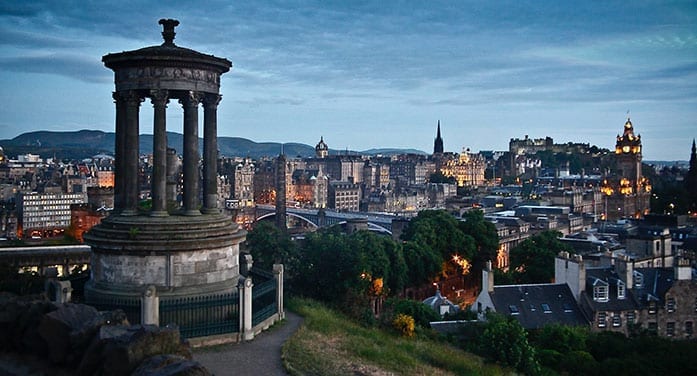 May 6 will be an interesting day for anyone following politics in the United Kingdom. Along with various local council votes, there’ll be an election for all 129 seats in the Scottish Parliament and a byelection for the vacant Westminster seat in Hartlepool. The results of the last two will be keenly watched.
May 6 will be an interesting day for anyone following politics in the United Kingdom. Along with various local council votes, there’ll be an election for all 129 seats in the Scottish Parliament and a byelection for the vacant Westminster seat in Hartlepool. The results of the last two will be keenly watched.
There’s not much doubt about the macro outcome in Scotland. The government of First Minister Nicola Sturgeon’s Scottish National Party (SNP) will almost certainly be re-elected. The only question is the size of the mandate.
The SNP’s reason for being pertains to Scottish independence. And if they win an outright majority, the demands for another independence referendum will be incessant.
True, the 2014 referendum – which the independence movement lost – was explicitly premised on being a once-in-a-generation vote. But things have changed.
Brexit – opposed by a majority of Scots – has altered the context. No longer in the European Union, the U.K. isn’t what it was in 2014. So a plausible case can be made for a second vote.
Sturgeon is politically adept. Gifted with a Scottish-style common touch, she exudes a sense of authenticity. And while this doesn’t mean she’s upfront about the challenges and trade-offs involved in the independence project, it does give her licence with voters.
Sturgeon is also resilient. Like Canadian Prime Minister Justin Trudeau, she has the ability to slough off scandals that would cripple many other politicians. That’s a formidable asset.
But if Brexit has put wind in Scottish nationalist sails, it has also upped the complexity. Pulling off a successful secession has gotten tougher.
Scotland is a small country with precarious finances. Absent the subsidy from Westminster, there’d be some hard choices to make. And there’d be serious transitional issues to address.
That said, the 2014 environment could hold out the hope of an eventual landing spot. An independent Scotland would join the EU without impairing its access to the U.K.
Trade with the U.K. – where Scotland sends over half of its exports – would remain frictionless. And people would be free to move back and forth without any impediments.
But post-Brexit, that’s not the case.
Within the EU, an independent Scotland would be obligated – by the EU – to establish a land border with England in order to facilitate the EU’s regulatory checks on trade. And unless Scotland secured an EU opt-out from the Schengen Agreement that brought down European borders for EU members, passports would be required for travel back and forth.
This doesn’t make Scottish independence impossible. It does, however, make it a steeper climb than in 2014.
The other one to watch – the Hartlepool byelection – could be significant. It’s a Labour seat in England’s northeast and should by rights be a safe hold.
As incumbent governments are customarily disadvantaged in byelections, the ruling Conservatives shouldn’t be at all optimistic about their chances. There’s also the matter of constituency history. Hartlepool has been a Labour seat since 1964, even managing to withstand Boris Johnson’s Conservative sweep in the 2019 general election.
As of writing, however, it’s seen as touch and go. And if Labour loses or just scrapes by, it’ll be difficult to deny the salience of those critics who contend the party has become dangerously disconnected from its traditional working-class base.
Paul Embery is one of the most trenchant critics. His recent book – Despised: Why the Modern Left Loathes the Working Class – spells out his case in passionate detail.
Embery is a Labour Party member and trade unionist who grew up in the working class borough of Barking and Dagenham. He identifies politically as a democratic socialist.
At the organizational level, Embery sees the modern Labour Party as “comprised largely of middle-class liberals, students and social activists.” And consumed by identity politics and Twitter woke-dom, it has little in common with its traditional base. In fact, it actively despises them.
The base, for its part, sees the world differently. It has a belief system that can be described as “patriotic, often socially conservative, communitarian, rooted, and which places a high value on family, place, social solidarity and cultural stability.”
Or in the formulation expressed by the journalist David Goodhart, the Labour activists see themselves as citizens of the world whereas the base are citizens of the U.K. That’s not a trivial distinction.
May 6 will certainly be interesting to watch.
Troy Media columnist Pat Murphy casts a history buff’s eye at the goings-on in our world. Never cynical – well perhaps a little bit.
For interview requests, click here.
The views, opinions and positions expressed by columnists and contributors are the authors’ alone. They do not inherently or expressly reflect the views, opinions and/or positions of our publication.
© Troy Media
Troy Media is an editorial content provider to media outlets and its own hosted community news outlets across Canada.


